Editor’s Note: This is the eleventh chapter of Alfred the Great, by Jacob Abbot (published 1872).
(Continued from Part 10)
XI. The Character of Alfred’s Reign
Perhaps the chief aspect in which King Alfred’s character has attracted the attention of mankind, is in the spirit of humanity and benevolence which he manifested, and in the efforts which he made to cultivate the arts of peace, and to promote the intellectual and social welfare of his people, notwithstanding the warlike habits to which he was accustomed in his early years, and the warlike influences which surrounded him during all his life. Everything in the outward circumstances in which he was placed tended to make him a mere military hero. He saw, however, the superior greatness and glory of the work of laying the foundations of an extended and permanent power, by arranging in the best possible manner the internal organization of the social state. He saw that intelligence, order, justice, and system, prevailing in and governing the institutions of a country, constitute the true elements of its greatness, and he acted accordingly.
It is true, he had good materials to work with. He had the Anglo-Saxon race to act upon at the time, a race capable of appreciating and entering into his plans; and he has had the same race to carry them on, for the ten centuries which have elapsed since he laid. His foundations. As no other race of men but Anglo-Saxons could have produced an Alfred, so, probably, no other race could have carried out such plans as Alfred formed. It is a race which has always been distinguished, like Alfred their great prototype and model, for a certain cool and intrepid energy in war, combined with and surpassed by the industry, they system, the efficiency, and the perseverance with which they pursue and perfect all the arts of peace. They systematize every thing. They arrange—they organize. Every thing in their hands takes form, and advances to continual improvement. Even while the rest of the world remain inert, they are active. When the arts and improvements of life are stationary among other nations, they are always advancing with them. It is a people that is always making new discoveries, pressing forward to new enterprises, framing new laws, constituting new combinations and developing new powers; until now after the lapse of a thousand years, the little island feeds and clothes, directly or indirectly, a very large portion of the human race, and directs, in a great measure, the politics of the world.
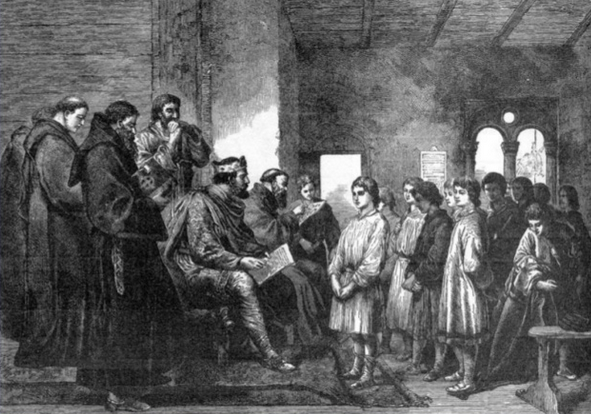
Whether Alfred reasoned upon the capacities of the people whom he ruled, and foresaw their future power, or whether he only followed the simple impulses of his own nature in the plans which he formed and the measures which he adopted, we can not know; but we know that, in fact, he devoted his chief attention, during all the years of his reign, to perfecting in the highest degree the internal organization of his realm, considered as a great social community. His people were in a very rude, and, in fact, almost half-savage state when he commenced his career. He had every thing to do, and yet he seems to have had no favorable opportunities for doing any thing.
In the first place, his time and attention were distracted, during his whole reign, by continued difficulties and contentions with various hordes of Danes, even after his peace with Guthrum. These troubles, and the military preparations and movements to which they would naturally give rise, would seem to have been sufficient to have occupied fully all the powers of his mind, and to have prevented him from doing any thing effectual for the internal improvement of his kingdom.
Then, besides, there was another difficulty with which Alfred had to contend, which one might have supposed would have paralyzed all his energies. He suffered all his life from some mysterious and painful internal disease, the nature of which, precisely, is not known, as the allusions to it, though very frequent throughout his life, are very general, and the physicians of the day, who probably were not very skillful, could not determine what it was, or do any thing effectual to relieve it. The disease, whatever it may have been, was a source of continual uneasiness, and sometimes of extreme and terrible suffering. Alfred bore all the pain which it caused him with exemplary patience; and, though he could not always resist the tendency to discouragement and depression with which the perpetual presence of such a torment wears upon the soul, he did not allow it to diminish his exertions, or suspend, at any time, the ceaseless activity with which he labored for the welfare of the people of his realm.
Alfred attached great importance to the education of his people. It was not possible, in those days, to educate the mass, for there were no books, and no means of producing them in sufficient numbers to supply any general demand. Books, in those days, were extremely costly, as they had all to be written laboriously by hand. The great mass of the population, therefore, who were engaged in the daily toil of cultivating the land, were necessarily left in ignorance; but Alfred made every effort in his power to awaken a love for learning and the arts among the higher classes. He set them, in fact, an efficient example in his own case, by pressing forward diligently in his own studies, even in the busiest periods of his reign. The spirit and manner in which he did this are well illustrated by the plan he pursued in studying Latin. It was this:
He had a friend in his court, a man of great literary attainments and great piety, whose name was Asser. Asser was a bishop in Wales when Alfred first heard of his fame as a man of learning and abilities, and Alfred sent for him to come to his court and make him a visit. Alfred was very much pleased with what he saw of Asser at this interview, and proposed to him to leave his preferments in Wales, which were numerous and important, and come into his kingdom, and he would give him greater preferments there. Asser hesitated. Alfred then proposed to him to spend six months every year in England, and the remaining six in Wales. Asser said that he could not give an answer even to this proposal till he had returned home and consulted with the monks and other clergy under his charge there. He would, however, he said, at least come back and see Alfred again within the next six months, and give him his final answer. Then, after having spent four days in Alfred’s court, he went away.
The six months passed away and he did not return. Alfred sent a messenger into Wales to ascertain the reason. The messenger found that Asser was sick. His friends, however, had advised that he should accede to Alfred’s proposal to spend six months of the year in England, as they thought that by that means, through his influence with Alfred, be would be the better able to protect and advance the interests of their monasteries and establishments in Wales. So Asser went to England, and became during six months in the year Alfred’s constant friend and teacher. In the course of time, Alfred placed him at the head of some of the most important establishments and ecclesiastical charges in England.
One day—it was eight or nine years after Alfred’s victory over Guthrum and settlement of the kingdom—the king, and Asser were engaged in conversation in the royal apartments, and Asser quoted some Latin phrase with which, on its being explained, Alfred was very much pleased, and he asked Asser to write it down for him in his book. So saying, he took from his pocket a little book of prayers and other pieces of devotion, which he was accustomed to carry with him for daily use. It was, of course, in manuscript. Asser looked over it to find a space where he could write the Latin quotation, but there was no convenient vacancy. He then proposed to Alfred that he should make for him another small book, expressly for Latin quotations, with explanations of their meaning, if Alfred chose to make them, in the Anglo-Saxon tongue. Alfred highly approved of this suggestion. The bishop prepared the little parchment volume and it became gradually filled with passages of Scripture, in Latin, and striking sentiments, briefly and tersely expressed, extracted from the writings of the Roman poets or of the fathers of the Church. Alfred wrote opposite to each quotation its meaning, expressed in his own language; and as he made the book his constant companion, and studied it continually, taking great interest in adding to its stores, it was the means of communicating to him soon a very considerable knowledge of the language, and was the foundation of that extensive acquaintance with it which he subsequently acquired.

Alfred made great efforts to promote in every way the intellectual progress and improvement of his people. He wrote and translated books, which were published so far as it was possible to publish books in those days, that is, by having a moderate number of copies transcribed and circulated among those who could read them. Such copies were generally deposited at monasteries, and abbeys, and other such places, where learned men were accustomed to assemble. These writings of Alfred exerted a wide influence during his day. They remained in manuscript until the art of printing was invented, when many of them were printed; others remain in manuscript in the various museums of England, where visitors look at them as curiosities, all worn and corroded as they are, and almost illegible by time. These books, though they exerted great influence at the time when they were written, are of little interest or value now. They express ideas in morals and philosophy, some of which have become so universally diffused as to be commonplace at the present day, while others would now be discarded, as not in harmony with the ideas or the philosophy of the times.
One of the greatest and most important of the measures which Alfred adopted for the intellectual improvement of his people was the founding of the great University of Oxford. Oxford was Alfred’s residence and capital during a considerable part of his reign. It is situated on the Thames, in the bosom of a delightful valley, where it calmly reposes in the midst of fields and meadows as verdant and beautiful as the imagination can conceive. There was a monastery at Oxford before Alfred’s day, and for many centuries after his time acts of endowment were passed and charters granted, some of which were perhaps of greater importance than those which emanated from Alfred himself. Thus some carry back the history of this famous university beyond Alfred’s time; others consider that the true origin of the present establishment should be assigned to a later date than his day. Alfred certainly adopted very important measures at Oxford for organizing and establishing schools of instruction and assembling learned men there from various parts of the world, so that he soon made it a great center and seat of learning, and mankind have been consequently inclined to award to him the honor of having laid the foundations of the vast superstructure which has since grown up on that consecrated spot. Oxford is now a city of ancient and venerable colleges. Its silent streets; its grand quadrangles; its churches, and chapels, and libraries; its secluded walks; its magnificent, though old and crumbling architecture, make it, even to the passing traveler, one of the wonders of England; and by the influence which it has exerted for the past ten centuries on the intellectual advancement of the human race, it is really one of the wonders of the world.
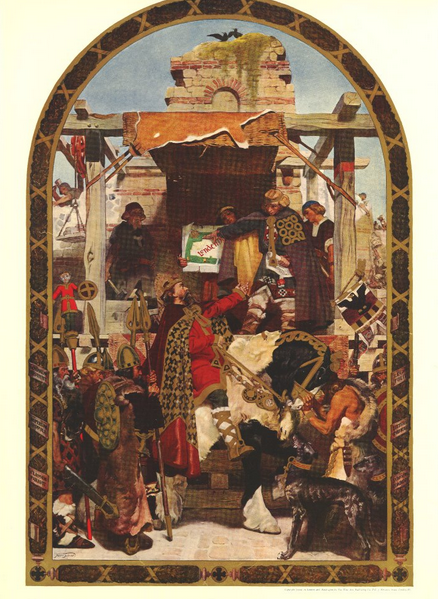
Alfred repaired the castles which had become dilapidated in the wars; he rebuilt the ruined cities, organized municipal governments for them, restored the monasteries, and took great pains to place men of learning and piety in charge of them. He revised the laws of the kingdom, and arranged and systematized them in the most perfect manner which was possible in times so rude.
Alfred’s personal character gave him great influence among his people, and disposed them to acquiesce readily in the vast innovations and improvements which he introduced—changes which were so radical and affected so extensively the whole structure of society, and all the customs of social life, that any ordinary sovereign would have met with great opposition in his attempt to introduce them; but Alfred possessed such a character, and proceeded in such a way in introducing his improvements and reforms, that he seems to have awakened no jealousy and to have aroused no resistance.
He was of a very calm, quiet, and placid temper of mind. The crosses and vexations which disturb and irritate ordinary men seemed never to disturb his equanimity. He was patient and forbearing, never expecting too much of those whom he employed, or resenting angrily the occasional neglects or failures in duty on their part, which he well knew must frequently occur. He wag never elated by prosperity, nor made moody and morose by the turning of the tide against him. In a word, he was a philosopher, of a calm, and quiet, and happy temperament. He knew well that every man in going through life, whatever his rank and station, must encounter the usual alternations of sunshine and storm. He determined that these alternations should not mar his happiness, nor disturb the repose of his soul; that he would, on the other hand, keeping all quiet within, press calmly and steadily forward in the accomplishment of the vast objects to which he felt that his life was to be given. He was, accordingly, never anxious or restless, never impatient or fretful, never excited or wild; but always calm, considerate, steady, and persevering, he infused his own spirit into all around him. They saw him governed by fixed and permanent principles of justice and of duty in all that he planned, and in every measure that he resorted to in the execution of his plans. It was plain that his great ruling motive was a true and honest desire to promote the welfare and prosperity of his people, and the internal peace, and order, and happiness of his realm. without any selfish or sinister aims of his own.
In fact, it seemed as if there were no selfish or sinister ends that possessed any charms for Alfred’s mind. He had no fondness or taste for luxury or pleasure, or for aggrandizing himself in the eyes of others by pomp and parade. It is true that, as was stated in a former chapter, he was charged in early life with a tendency to some kinds of wrong indulgence; but these charges, obscure and doubtful as they were, pertained only to the earliest periods of his career, before the time of his seclusion. Through all the middle and latter portions of his life, the sole motive of his conduct seems to have been a desire to lay broad, and deep, and lasting foundations for the permanent welfare and prosperity of his realm.
It resulted from the nature of the measures which Alfred undertook to effect, that they brought upon him daily a vast amount of labor, as such measures always involve a great deal of minute detail. Alfred could only accomplish this great mass of duty by means of the most unremitting industry, and the most systematic and exact division of time. There were no clocks or watches in those days, and yet it was very necessary to have some plan for keeping the time, in order that his business might go on regularly, and also that the movements and operations of his large household might proceed without confusion. Alfred invented a plan. It was as follows:
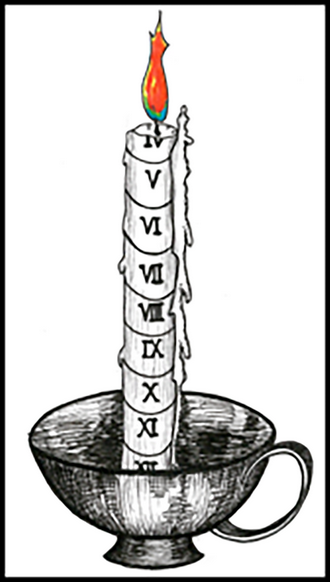
He observed that the wax candles which were used in his palace and in the churches burned very regularly, and with greater or less rapidity, according to their size. He ordered some experiments to be made, and finally, by means of them, he determined on the size of a candle which should burn three inches in an hour. It is said that the weight of wax which he used for each candle was twelve pennyweights, that is, but little more than half an ounce, which would make, one would suppose, a taper rather than a candle. There is, however, great doubt about the value of the various denominations of weight and measure, and also of money used in those days. However this may be, the candles were each a foot long, and of such size that each would burn four hours. They were divided into inches, and marked, so that each inch corresponded with a third of an hour, or twenty minutes. A large quantity of these candles were prepared, and a person in one of the chapels was appointed to keep a succession of them burning, and to ring the bells, or give the other signal whatever they might be, by which the house-hold was regulated, at the successive periods of time denoted by their burning.
As each of these candles was one foot long, and burned three inches in an hour, it follows that it would last four hours; when this time was expired, the attendant who had the apparatus in charge lighted another. There were, of course, six required for the whole twenty-four hours. The system worked very well, though, there was one difficulty that occasioned some trouble in the outset, which, however, was not much to be regretted after all, since the remedying of it awakened the royal ingenuity anew, and led, in the end, to adding to Alfred’s other glories the honor of being the inventor of lanterns!
The difficulty was, that the wind, which came in very freely in those days, even in royal residences, through the open windows, blew the flames of these horological candles about, so as to interfere quite seriously with the regularity of their burning. There was no glass for windows in those days, or, at least, very little. It had been introduced, it is said, in one instance, and that was in a monastery in the north of England. The abbot, whose name was Benedict, brought over some workmen from the Continent, where the art of making glass windows had been invented, and caused them to glaze some windows in his monastery. It was many years after this before glass came into general use even in churches, and palaces, and other costly buildings of that kind. In the mean time, windows were mere openings in stone walls, which could be closed only by shutters; and inasmuch as when closed they excluded the light as well as the air, they could ordinarily be shut only on one side of the apartment at a time—the side most exposed to the winds and storms.

Alfred accordingly found that the flame of his candles was blown by the wind, which made the wax burn irregularly; and, to remedy the evil, he contrived the plan of protecting them by thin plates of horn. Horn, when softened by hot water, can easily be cut and fashioned into any shape, and, when very thin, is almost transparent. Alfred had these thin plates of horn prepared, and set into the sides of a box made open to receive them, thus forming a rude sort of lantern, within which the time-keeping candles could burn in peace. Mankind have consequently given to King Alfred the credit of having invented lanterns.
Having thus completed his apparatus for the correct measurement of time, Alfred was enabled to be more and more systematic in the division and employment of it. One of the historians of the day relates that his plan was to give one third of the twenty-four hours to sleep and refreshment, one third to business, and the remaining third to the duties of religion. Under this last head was probably included all those duties and pursuits which, by the customs of the day were considered as pertaining to the Church, such as study, writing, and the consideration and management of ecclesiastical affairs. These duties were performed, in those days, almost always by clerical men, and in the retirement and seclusion of monasteries, and were this regarded as in some sense religious duties. We must conclude that Alfred classed them thus, as he was a great student and writer all his days, and there is no other place than this third head to which the duties of this nature can be assigned. Thus understood, it was a very wise and sensible division; though eight hours daily for any long period of time, appropriated to services strictly devotional, would not seem to be a wise arrangement, especially for a man in the prime of life, and in a position demanding the constant exercise of his powers in the discharge of active duties.
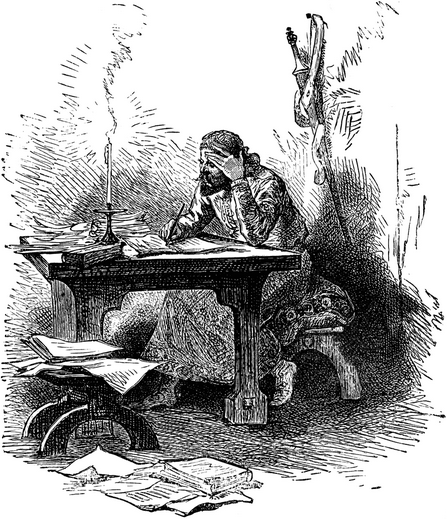
Thus the years of Alfred’s life passed away, his kingdom advancing steadily all the time in good government, wealth, and prosperity. The country was not, however, yet freed entirely from the calamities and troubles arising from the hostility of the Danes. Disorders continually broke out among those who had settled in the land, and, in some instances, new hordes of invaders came, in. These were, however, in most instances, easily subdued, and Alfred went on with comparatively little interruption for many years, in prosecuting the arts and improvements of peace. At last, however, toward the close of his life, a famous Northman leader, named Hastings, landed in England at the head of a large force, and made, before, he was expelled, a great deal of trouble. An account of this invasion will be given in the next chapter.

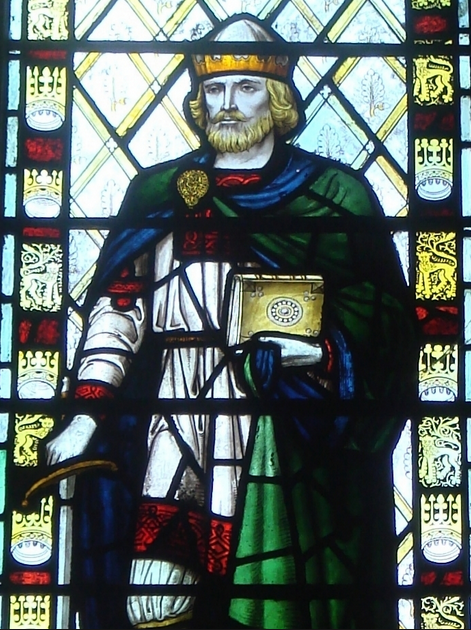








[…] Read Part 11 here […]